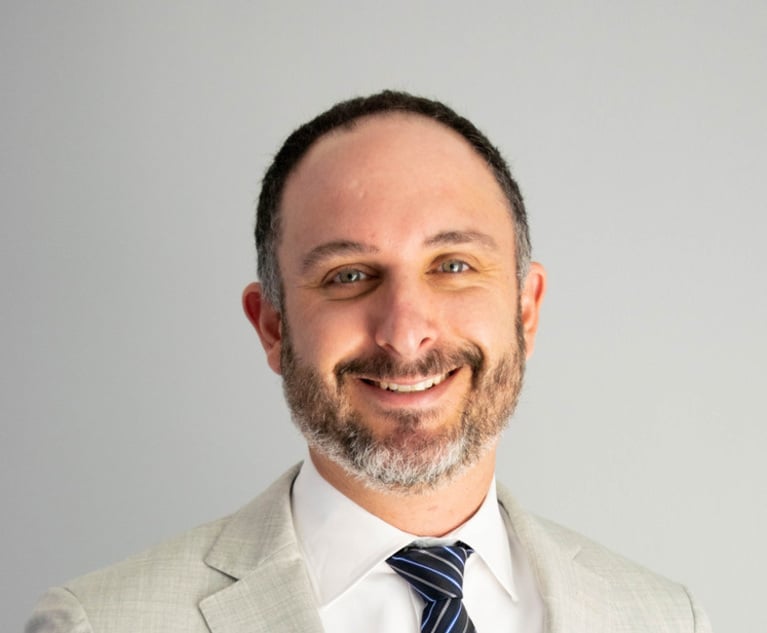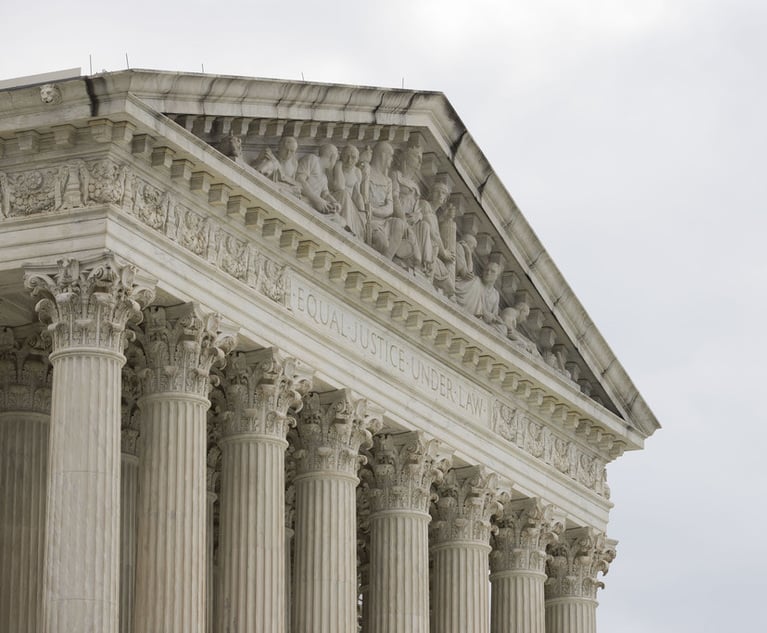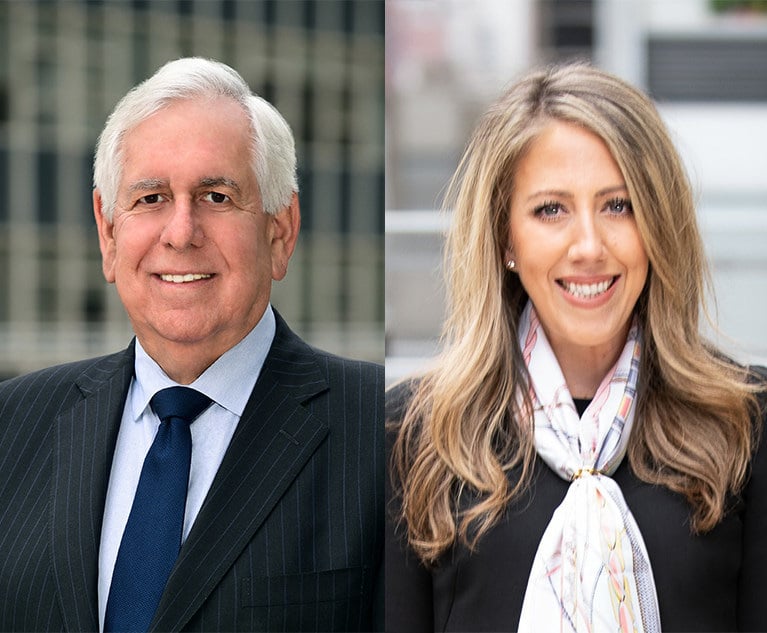Progressive Groups Warn Against Constitutional Convention
A coalition of progressive groups including the NYCLU and Legal Aid Society announced its opposition to a ballot measure on Nov. 7 that asks whether New Yorkers should hold a convention to revise and amend the state constitution next year.
October 30, 2017 at 03:02 PM
12 minute read
 Opening up the state constitution for revisions during a constitutional convention is not a risk New Yorkers should take, a coalition of progressive groups said Monday morning in Albany.
Opening up the state constitution for revisions during a constitutional convention is not a risk New Yorkers should take, a coalition of progressive groups said Monday morning in Albany.
The groups—which included the Legal Aid Society, the New York Civil Liberties Union, the Fiscal Policy Institute, a nonpartisan think tank, and Environmental Advocates of New York—argued that a constitutional convention could jeopardize existing provisions in the state constitution and become a magnet for outside “dark money.”
“We're very concerned that there is far more to lose than there is to gain,” said Ron Deutsch, the executive director of the Fiscal Policy Institute.” We're concerned about what we believe is a rigged delegate selection process. Three delegates are selected from heavily gerrymandered Senate districts all across New York state and independent people not affiliated with parties have much higher hurdles to clear to become engaged and involved in this process and to become delegates.”
On Nov. 7, voters in New York will decide on the referendum question, “Shall there be a convention to revise the constitution and amend the same?” The referendum is presented to voters once every 20 years under the state constitution. In 1997, voters rejected the ballot measure.
If the referendum is approved, New Yorkers would elect delegates in 2018 to the convention, which would meet in 2019. At the convention, delegates would get to propose amendments to the state constitution for voter ratification. Then, in November 2019, the electorate would get a chance to vote on each proposed amendment.
Susan Welber, a staff attorney at the Legal Aid Society, said Monday that her organization was worried about changes made to the Article 17, Section 1 of the state constitution, which states that “aid, care and support of the needy are public concerns and shall be provided by the state.”
Article 17 of the state constitution acts as a “bouncer” for when the state “moves in the wrong direction on social welfare issues,” Welber added, noting that several pieces of legislation have been introduced in New York to weaken the provision.
“This is not some theoretical fear. It's on the radar of many,” she added.
Debate over the constitutional convention has made for strange bedfellows: The head of the state's conservative party has banded together with labor unions, environmentalists, liberal and conservative groups to create New Yorkers Against Corruption, a campaign opposing the constitutional convention.
New Yorkers Against Corruption reported having $636,000 in their campaign coffers in July, according to a review of their financial disclosures filed with the state's Board of Elections. The bulk of their money came from contributions from several unions, including 1199 SEIU, the state's powerful health care workers union; the Civil Service Employees Association; the American Federation of State, County and Municipal Employees and the New York State United Teachers union. Since July, the campaign has continued to rake in contributions. According to their financial disclosure filed early this month, New Yorkers Against Corruption received roughly $742,000 in contributions between July and early October, mainly from labor unions.
The group's latest financial disclosure—filed 11 days before the election next month—show that in the last few weeks, New Yorkers Against Corruption received $1.8 million in contributions and spent $1.1 million. The state's teachers union was the single largest donor, giving the campaign $500,000 in mid-October. NYSUT was followed by AFSCME, which donated $350,000. The campaign spent $573,000 on television ads with the public strategy firm Kivvit, disclosures show, as well as thousands on campaign mailers, digital ad buys, consultation and canvassing with Kivvit and Red Horse Strategies, a Brooklyn-based public relations firm.
Several law firms also made recent contributions to New Yorkers Against Corruption, though their contributions pale in comparison to the donations made by the labor unions. Newburgh-based Fine, Olin & Anderman, which serves the “legal needs of union members” donated $12,500. Kennedy, Jennik & Murray, which represents unions and employees, donated $5,000 last week. Weitz & Luxenberg, a personal injury litigation firm, and Levy Ratner, a labor advocacy law firm, each donated $2,500 to New Yorkers Against Corruption this month.
The state's Supreme Court justices have also come out in opposition to a constitutional convention (NYLJ Oct. 19), claiming that not only is it “unnecessary,” but it would also be “overly costly, and could result in the reversion, elimination or diminution of many current constitutional rights and safeguards.” The New York State Magistrates Association, which represents the town and village justices throughout the state, have also voted to oppose the constitutional convention, arguing that delegates “could impose a fantastically expensive district court system at far greater annual cost to the taxpayers than our justice courts are now, without the 24-hour availability for which we are renowned.”
Meanwhile, the New York State Bar Association has come out in favor of holding a constitutional convention to fix a “confusing and inefficient” court system (NYLJ Sept. 19). While proponents of a convention have been on an advertising blitz, the sate bar's campaign has been much more scaled down, relying on volunteers.
In comparison to New Yorkers Against Corruption, the Committee for a Constitutional Convention's fundraising apparatus is far smaller. According to their latest financial disclosure, filed 11 days before the election, the Committee for a Constitutional Convention raised more than $14,000 this month, and spent $5,500 on campaign consultants. Between July and early October, the group raised nearly $29,000, spending $42,000 on campaign consultants.
 Opening up the state constitution for revisions during a constitutional convention is not a risk New Yorkers should take, a coalition of progressive groups said Monday morning in Albany.
Opening up the state constitution for revisions during a constitutional convention is not a risk New Yorkers should take, a coalition of progressive groups said Monday morning in Albany.
The groups—which included the Legal Aid Society, the
“We're very concerned that there is far more to lose than there is to gain,” said Ron Deutsch, the executive director of the Fiscal Policy Institute.” We're concerned about what we believe is a rigged delegate selection process. Three delegates are selected from heavily gerrymandered Senate districts all across
On Nov. 7, voters in
If the referendum is approved, New Yorkers would elect delegates in 2018 to the convention, which would meet in 2019. At the convention, delegates would get to propose amendments to the state constitution for voter ratification. Then, in November 2019, the electorate would get a chance to vote on each proposed amendment.
Susan Welber, a staff attorney at the Legal Aid Society, said Monday that her organization was worried about changes made to the Article 17, Section 1 of the state constitution, which states that “aid, care and support of the needy are public concerns and shall be provided by the state.”
Article 17 of the state constitution acts as a “bouncer” for when the state “moves in the wrong direction on social welfare issues,” Welber added, noting that several pieces of legislation have been introduced in
“This is not some theoretical fear. It's on the radar of many,” she added.
Debate over the constitutional convention has made for strange bedfellows: The head of the state's conservative party has banded together with labor unions, environmentalists, liberal and conservative groups to create New Yorkers Against Corruption, a campaign opposing the constitutional convention.
New Yorkers Against Corruption reported having $636,000 in their campaign coffers in July, according to a review of their financial disclosures filed with the state's Board of Elections. The bulk of their money came from contributions from several unions, including 1199 SEIU, the state's powerful health care workers union; the Civil Service Employees Association; the American Federation of State, County and Municipal Employees and the
The group's latest financial disclosure—filed 11 days before the election next month—show that in the last few weeks, New Yorkers Against Corruption received $1.8 million in contributions and spent $1.1 million. The state's teachers union was the single largest donor, giving the campaign $500,000 in mid-October. NYSUT was followed by AFSCME, which donated $350,000. The campaign spent $573,000 on television ads with the public strategy firm Kivvit, disclosures show, as well as thousands on campaign mailers, digital ad buys, consultation and canvassing with Kivvit and Red Horse Strategies, a Brooklyn-based public relations firm.
Several law firms also made recent contributions to New Yorkers Against Corruption, though their contributions pale in comparison to the donations made by the labor unions. Newburgh-based Fine, Olin & Anderman, which serves the “legal needs of union members” donated $12,500. Kennedy, Jennik & Murray, which represents unions and employees, donated $5,000 last week.
The state's Supreme Court justices have also come out in opposition to a constitutional convention (NYLJ Oct. 19), claiming that not only is it “unnecessary,” but it would also be “overly costly, and could result in the reversion, elimination or diminution of many current constitutional rights and safeguards.” The
Meanwhile, the
In comparison to New Yorkers Against Corruption, the Committee for a Constitutional Convention's fundraising apparatus is far smaller. According to their latest financial disclosure, filed 11 days before the election, the Committee for a Constitutional Convention raised more than $14,000 this month, and spent $5,500 on campaign consultants. Between July and early October, the group raised nearly $29,000, spending $42,000 on campaign consultants.
This content has been archived. It is available through our partners, LexisNexis® and Bloomberg Law.
To view this content, please continue to their sites.
Not a Lexis Subscriber?
Subscribe Now
Not a Bloomberg Law Subscriber?
Subscribe Now
NOT FOR REPRINT
© 2025 ALM Global, LLC, All Rights Reserved. Request academic re-use from www.copyright.com. All other uses, submit a request to [email protected]. For more information visit Asset & Logo Licensing.
You Might Like
View All
For Safer Traffic Stops, Replace Paper Documents With ‘Contactless’ Tech
4 minute read
Impact of New NYS Workers’ Compensation Work-Related Stress Relief on Discrimination Claims

Justices Will Weigh Constitutionality of Law Allowing Terror Victims to Sue PLO

Are New York City Housing Providers Ready for the Fair Chance for Housing Act?
10 minute readTrending Stories
Who Got The Work
Michael G. Bongiorno, Andrew Scott Dulberg and Elizabeth E. Driscoll from Wilmer Cutler Pickering Hale and Dorr have stepped in to represent Symbotic Inc., an A.I.-enabled technology platform that focuses on increasing supply chain efficiency, and other defendants in a pending shareholder derivative lawsuit. The case, filed Oct. 2 in Massachusetts District Court by the Brown Law Firm on behalf of Stephen Austen, accuses certain officers and directors of misleading investors in regard to Symbotic's potential for margin growth by failing to disclose that the company was not equipped to timely deploy its systems or manage expenses through project delays. The case, assigned to U.S. District Judge Nathaniel M. Gorton, is 1:24-cv-12522, Austen v. Cohen et al.
Who Got The Work
Edmund Polubinski and Marie Killmond of Davis Polk & Wardwell have entered appearances for data platform software development company MongoDB and other defendants in a pending shareholder derivative lawsuit. The action, filed Oct. 7 in New York Southern District Court by the Brown Law Firm, accuses the company's directors and/or officers of falsely expressing confidence in the company’s restructuring of its sales incentive plan and downplaying the severity of decreases in its upfront commitments. The case is 1:24-cv-07594, Roy v. Ittycheria et al.
Who Got The Work
Amy O. Bruchs and Kurt F. Ellison of Michael Best & Friedrich have entered appearances for Epic Systems Corp. in a pending employment discrimination lawsuit. The suit was filed Sept. 7 in Wisconsin Western District Court by Levine Eisberner LLC and Siri & Glimstad on behalf of a project manager who claims that he was wrongfully terminated after applying for a religious exemption to the defendant's COVID-19 vaccine mandate. The case, assigned to U.S. Magistrate Judge Anita Marie Boor, is 3:24-cv-00630, Secker, Nathan v. Epic Systems Corporation.
Who Got The Work
David X. Sullivan, Thomas J. Finn and Gregory A. Hall from McCarter & English have entered appearances for Sunrun Installation Services in a pending civil rights lawsuit. The complaint was filed Sept. 4 in Connecticut District Court by attorney Robert M. Berke on behalf of former employee George Edward Steins, who was arrested and charged with employing an unregistered home improvement salesperson. The complaint alleges that had Sunrun informed the Connecticut Department of Consumer Protection that the plaintiff's employment had ended in 2017 and that he no longer held Sunrun's home improvement contractor license, he would not have been hit with charges, which were dismissed in May 2024. The case, assigned to U.S. District Judge Jeffrey A. Meyer, is 3:24-cv-01423, Steins v. Sunrun, Inc. et al.
Who Got The Work
Greenberg Traurig shareholder Joshua L. Raskin has entered an appearance for boohoo.com UK Ltd. in a pending patent infringement lawsuit. The suit, filed Sept. 3 in Texas Eastern District Court by Rozier Hardt McDonough on behalf of Alto Dynamics, asserts five patents related to an online shopping platform. The case, assigned to U.S. District Judge Rodney Gilstrap, is 2:24-cv-00719, Alto Dynamics, LLC v. boohoo.com UK Limited.
Featured Firms
Law Offices of Gary Martin Hays & Associates, P.C.
(470) 294-1674
Law Offices of Mark E. Salomone
(857) 444-6468
Smith & Hassler
(713) 739-1250






